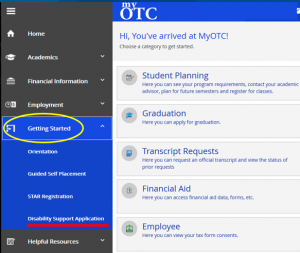New and returning students follow the steps below to apply for accommodations at OTC.
- ACCOMMODATION PROCESS
- Step 1: Become an OTC Student
- Step 2: Apply for Services
- Step 3: Gather Documentation
- Step 4: Meet With Accessibility Coordinator
- Step 5: Share Your Letter
- Step 6: Keep in Contact
This step-by-step process is to establish accommodation services for currently enrolled OTC students with a disability -or- students returning after one year (or longer) to reestablish services.
Become an OTC Student
Complete application process at OTC. Once accepted you will have access to your own myOTC page.
Gather Documentation
Gather your supporting documentation for your initial meeting. You can send it to DSS via email at disabilityservices@otc.edu
Students should submit at least one of the following:
- Individualized Education Plan (IEP) from high school
- 504 plan with diagnosis from high school, including the name of the diagnostician or specialist and the date of diagnosis
- Medical records/patient portal diagnostic summary
- Psychological full evaluation/diagnostic report
- Psychoeducational evaluation with recommendations
- Letter from a healthcare professional. on letterhead, which confirms a diagnosis and it’s impact.
Meet with AC
After submitting your completed application, the DSS office will contact you to schedule an appointment with a DSS Accessibility Coordinator.
You will receive a phone call and an email in an effort to schedule your one hour intake appointment
You will confirm your documentation either by submitting it electronically or verbally confirming and bringing it to the appointment
During your appointment through an interactive process, including your supporting documentation, we will determine if a plan is appropriate and create that plan together.
Share Your Accommodation Letter
In order to use your accommodations, you must present your letter to your instructors.
DSS will email your accommodation letter to your OTC student email address. You should forward the Accommodation Letter to your instructors. Be sure to discuss your letter with your instructors.
Keep in Contact with DSS
Inform DSS of any changes that occur in your health that may impact your accommodation needs. Feel free to come into our office anytime with any questions or concerns. We also love to hear your feedback and success stories!
Additional Information
Service Animals on Campuses and in Classrooms
Students and third parties who wish to bring a service animal onto college property – including classrooms and college buildings open to the public – may do so without prior approval. However, students are strongly encouraged to contact Disability Support Services to ensure that their experience bringing the animal to campus is without issue.
When it is not obvious or apparent what disability-related service an animal provides, college personnel may ask: (1) if the animal is a service animal required because of a disability, and (2) what work or task the animal has been trained to perform. College personnel cannot ask for details about the individual’s disability, require medical documentation, or require proof that the animal has been certified, trained, or licensed as a service animal..
Service Animals in Training
Service animals in training are permitted in all public facilities on the same basis as working service animals, provided that the animal is on a leash and is being led or accompanied by a trainer for the purpose of training the animal and the trainer has documentation confirming the trainer is affiliated with a recognized or certified service animal training organization.
Control of Service Animals
A service animal must be under the control of its handler. Service animals must be harnessed, leashed, or tethered, unless the individual’s disability prevents using these devices or these devices interfere with the service animal’s safe and effective performance of tasks. In that case, the individual must maintain control of the animal through voice, signal, or other effective controls.
Please refer to OTC policy 4.11 for further information.
Frequently Asked Questions about Service Animals and the ADA
Emotional Support Animals on Campuses and in Classrooms
Students who requesting to bring an ESA into their classrooms must apply for and complete the process to receive accommodations through Disability Support Services. Application for services that may include an ESA accommodation should be submitted at least 30 days before the student plans to bring the animal onto college property. The student’s qualified current provider (psychiatrist, psychologist, or other licensed mental health professional) must complete the ESA Request for Information Form.
An ESA will not be allowed until formal approval has been established. The student will be informed of any restrictions or delays in the approval process.
To ensure that the presence of an ESA is not an undue administrative burden or fundamental alteration of a college program or activity, the college will consider each request for an ESA on an individualized basis.
Please refer to OTC Policy 4.11 for further information.

